Neurology Residency Program
General Overview of the Residency Training Program
.jpg?sfvrsn=96a642b9_2)
SITES
- University of Colorado Hospital (UCH)
- Denver Health Medical Center (DHMC)
- Rocky Mountain Regional VA Medical Center (VAMC)
- Children's Hospital of Colorado (CHCO)
PGY-1
Those applicants who match in our Adult Neurology program are guaranteed an Internal Medicine internship at University of Colorado. Rotations are at UCH, DHMC, and the VAMC during intern year and include inpatient general medicine wards, medical ICU, cardiology, ambulatory medicine, and emergency room. All Neurology interns have 2 months of Neurology rotations with time spent at both UCH and VAMC (with no call).
More information about our Internal Medicine program and schedule can be found here.
Neurology Schedule Format: We are on a 13 four-week block schedule
PGY-2 Sample Schedule
- UCH Neurology Inpatient service and Consultation service (4 blocks)
- General Neurology Service with one 24-hour call per block (1 block)
- Stroke Service with one 24-hour call per block (1 block)
- Consult Service - 2 weeks followed by 2 weeks of outpatient clinics. No call. (2 blocks)
- UCH Night Float: 2 weeks of night coverage split with a vacation week and 1 week of outpatient sub-specialty clinics at UCH (3 blocks)
- DHMC Consultation service and outpatient clinics with Q4 24-hour call per block (3 blocks)
- VAMC Consultation service and outpatient clinics. No call. (2 blocks)
- Epilepsy Monitoring Unit (EMU). No call. (1 block)
PGY-3 Sample Schedule
- UCH Neurology Inpatient and Consultation Service (3 blocks)
- General Neurology Service with one 24-hour call per block. (1 block)
- Stroke Service with one 24-hour call per block. (1 block)
- Consult Service - 2 weeks followed by 2 weeks of outpatient clinics. No call. (1 block)
- UCH "Nighthawk" Service: 2 weeks of cross-cover for UCH Inpatient Neurology Service, as well as the overnight "senior" for junior residents at UCH and DHMC. Split with 2 weeks of outpatient sub-specialty clinics at UCH (2 blocks)
- DHMC Consultation service and outpatient clinics with Q4 24-hour call per block (1 block)
- VAMC Consultation service and outpatient clinics. No call. (1 block)
- VA Night service: 2 weeks of home night call covering VA, a lighter rotation that is split with 2 weeks of outpatient sub-specialty clinics (1 block)
- CHCO Inpatient service, consultation service, and outpatient clinics (3 blocks)
- Electives with no call (3 blocks)
PGY-4 Sample Schedule
- UCH Neurology Inpatient and Consultation Service (2 blocks)
- General Neurology Service with one 24-hour call per block (1 block)
- Stroke Service with one 24-hour call per block (1 block)
- UCH "Nighthawk" service: 2 weeks of cross-cover for the UCH Inpatient Neurology Service, as well as the overnight "senior" for junior residents at UCH and DHMC. Split with 2 weeks of outpatient sub-specialty clinics at UCH (1 block)
- DHMC Consultation service and outpatient clinics with Q4 24-hour call per block (1 block)
- VAMC Consultation service and outpatient clinics. No call. (1 block)
- VA Night service: 2 weeks of home night call covering VA, a lighter rotation that is split with 2 weeks of outpatient specialty clinics (1 block)
- Psychiatry Consultation Service with no call (1 block)
- Epilepsy Monitoring Unit with no call (1 block)
- Electives with no call (4 blocks)
Electives
Autoimmune Neurology
Behavioral Neuorology
EEG/EMU
Electrophysiology
EMG
Epilepsy
Headache/Pain Medicine
Medical Educator's Elective
Movement Disorders
Multiple Sclerosis/Neuro-Immunology
Neuro-infectious Disease
Neuro-Intensive Care
Neuro-Interventional
Neuromuscular
Neuro-Oncology
Neuro-Ophthalmology
Neuroradiology
Neuropathology
Procedural (LPs, Botox injections, etc...)
Psychology
Research
Sleep
Traumatic Brain Injury - Marcus Institute for Brain Health
Vascular Neurology
Other approved electives can be designed by the resident with Program Director approval.
VACATION
3 weeks a year plus one week of educational leave
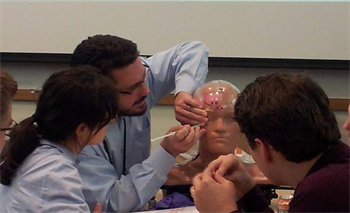
Neurologic expertise is obtained both through clinic work as well as dedicated and protected educational time to help build one’s knowledge base. Our program has many recurring educational conferences that provide residents multiple ways to participate in interactive learning sessions. More information about conference details can be found here.
The core conference time for residents is a 3 hour weekly session that occurs every Wednesday afternoon on the Anschutz Medical Campus that are broadcast to all clinical sites and are recorded for later viewing for those who cannot attend. The didactic curriculum is divided into specific blocks that allow an in-depth exploration over the course of several weeks into specific specialties and topics.
The didactic curriculum is based upon a three-tiered approach to resident learning. Clinical topics, as below, are supplemented with basics of neuroscience such as neuroanatomy, neuropharmacology, and neuropathophysiology. The third tier includes “professional development” with a wide range of topics including QI methodology, billing and coding, developing leadership skills, and the “business” of neurology including negotiating contracts and running a private practice.
Our didactic blocks include, but are not limited to:
- Emergencies in Neurology
- In July and August, lectures are geared towards approaches to urgent and emergent neurological disorders preparing residents for what they are likely to encounter on the wards and the ER. This includes stroke alert simulations that all PGY-2s participate in.
- Cerebrovascular Disease
- Movement Disorders
- Epilepsy and EEG
- Demyelinating and Inflammatory Disorders
- Neuromuscular and EMG
- Behavioral Neurology
- Headache
- Neuro-Ophthalmology
- Neuro-Infectious Disease
- Neuro-Oncology
- Sleep Disorders
- Pediatric Neurology
Example didactic block schedule:
CEREBROVASCULAR DISEASE
DATE/TIME TOPIC PRESENTER 8/26 1-2 PM Stroke Anatomy and Stroke Syndromes Pollard 2-3 PM Neuro-imaging of acute stroke Hartman 3-4 PM Ischemic stroke: epidemiology and risk factors Jones 4-5 PM Common Causes: small vessel and large artery Poisson 9/2 1-2 PM Strategic Planning Meeting Ney/West/Omran/Pratt 2-3 PM Common Causes: cardioembolic and ESUS Orjuela 3-4 PM Uncommon causes of stroke Malenky/Orjuela 4-5 PM Secondary stroke prevention Omran 9/9 1-2 PM Stroke in children and young adults Barry 2-3 PM Intracranial hemorrhage Case 3-4 PM Subarachnoid hemorrhage Morel/Omran 4-5 PM Business of Medicine Part 2 Pope

We strongly believe that wellness is at the core of successful residency training. Attention to well-being is essential for optimizing learning, promoting compassionate and highly skilled patient care, and career satisfaction. To this end, we take a multi-faceted approach to promote wellness within our program.
We have developed a formal wellness curriculum built into our educational didactic sessions. The overarching goal of this curriculum is to help residents navigate the unique challenges of intensive residency training. Formal lectures focus on topics including sleep and fatigue, burnout and depression and moral distress. Additionally, our resident and faculty wellness champions lead residents through debriefing sessions around difficult clinical encounters. Through education and systematic change, we strive to provide residents the essential tools to recognize challenges and develop resiliency to address them directly.
Multiple pre-scheduled days off are provided for residents during discrete rotations to allow for time to attend personal appointments and provide self-care.
Informally, the Department of Neurology sponsors monthly activities for residents to promote relationships outside of the hospital. Activities include happy hours, BBQs, baseball games, Top Golf, concerts and more. Additionally, residents organize regular outings amongst themselves to take advantage of everything that Denver and the Rocky Mountains has to offer including activities such as hiking, biking and skiing trips.
The GME at the University of Colorado also provides interactive online modules focused on resident wellness. Additionally, residents have free 24/7 access to the Resident Mental Health Clinic via scheduled and walk in appointments.
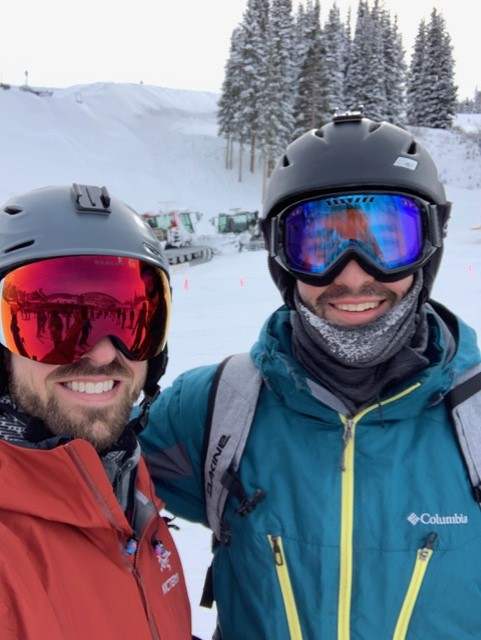
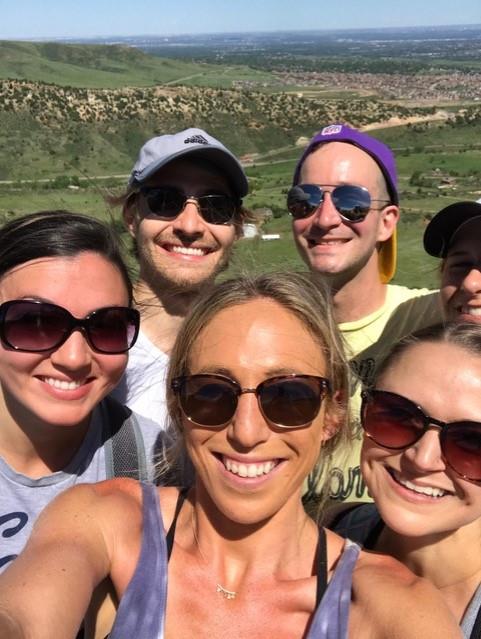
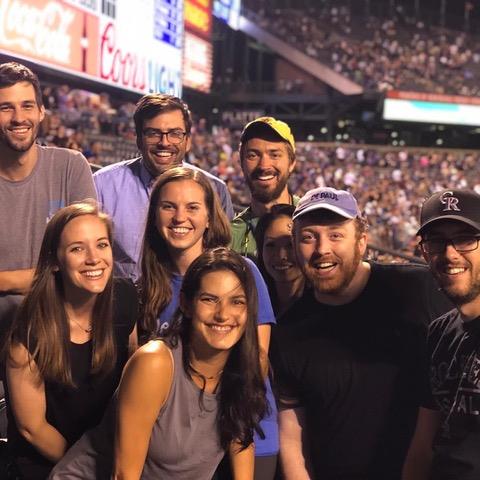
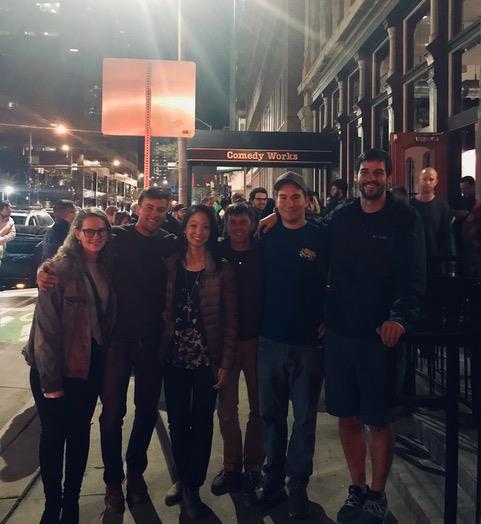
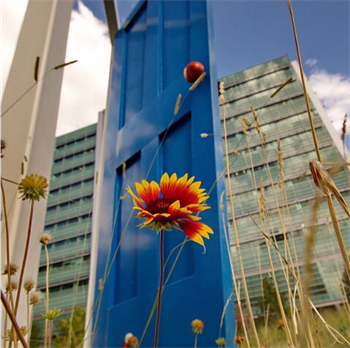 Career Development
Career Development
We strongly believe in our obligation to prepare residents for their future careers and to provide a well-rounded experience so that residents are prepared for future practice, no matter what direction they take.
Medical Education
Medical education is at the core of the residency program. Residents have numerous opportunities to formally and informally participate in teaching of medical students and fellow residents as well as on a departmental level. Additionally, opportunities exist to be evaluated and receive formal feedback of effectiveness of teaching. Interested residents can participate in formal residency and medical student education meetings and directly influence the future curriculum.
The Academy of Medical Educators provides rich opportunities and resources to hone teaching skills. Through the University of Colorado Academy of Medical Educators, residents can participate in an extremely popular one month teaching elective: Residents and Fellows as Medical Educators elective.
Patient Safety and Quality Improvement
The Department of Neurology has a robust program focused on quality improvement in all aspects of the department (including teaching). Working with our department based clinical QI leadership team, all residents participate in at least one QI project during their residency, although many participate in several projects! As part of the didactic curriculum, residents also learn QI methodology such as performing root cause analyses. Residents will also participate in quarterly case care conferences given in place of Grand Rounds.
Research
Research opportunities are abundant in the Department of Neurology and include everything from basic neuroscience, clinical, educational and quality improvement research. Residents learn fundamentals of research methodologies and design through their didactic curriculum and journal club experiences. From there, the sky is the limit! Residents are encouraged to explore their research interests early and develop projects with their mentors. Presentations at national meetings and publications are widely encouraged. All residents will complete at least one research project during their residency and will present at least one poster and one platform presentation at the annual Neurology Department Research Retreat
Personalized Mentorship
Every resident at the University of Colorado is assigned a faculty mentor beginning in their PGY-1 year. Mentors and mentees are required to meet several times a year and explore personal and professional goals. Recognizing that no one is able to successfully achieve their goals with a single mentor, faculty mentors recognize the importance of “pulling in” other mentors to help develop research and sub-specialty interests. Additionally, every 6 months each resident meets with the Program Director or Associate Program Director to discuss progress throughout residency, career interests and goals.